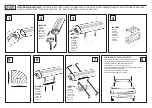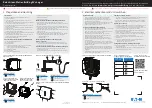
Radio signals, especially on the FM
band, are deflected by large objects
such as buildings and hills. Your
radio then receives both the direct
signal from the station’s transmitter,
and the deflected signal. This causes
the sound to distort or flutter. This is
a main cause of poor radio reception
in city driving.
Radio reception can be affected by
atmospheric conditions such as
thunderstorms, high humidity, and
even sunspots. You may be able to
receive a distant radio station one
day and not receive it the next day
because of a change in conditions.
Electrical interference from passing
vehicles and stationary sources
(such as garages or parking
structures) can cause temporary
reception problems.
As required by the FCC:
Changes or modifications not expressly
approved by the party responsible for
compliance could void the user’s
authority to operate the equipment.
AM/FM Radio Reception
386
11/01/14 19:00:59 31TK4630_391
Fe
a
tu
re
s
2012 TL
Summary of Contents for 2012 TL
Page 64: ...60 11 01 14 18 04 23 31TK4630_065 2012 TL I n f o r ma t i o nP r o v i d e db y ...
Page 228: ...224 11 01 14 18 32 45 31TK4630_229 2012 TL I n f o r ma t i o nP r o v i d e db y ...
Page 470: ...466 11 01 14 19 16 08 31TK4630_471 2012 TL I n f o r ma t i o nP r o v i d e db y ...
Page 584: ...580 11 01 14 19 35 42 31TK4630_585 2012 TL I n f o r ma t i o nP r o v i d e db y ...
Page 632: ...628 11 01 14 19 43 41 31TK4630_633 2012 TL I n f o r ma t i o nP r o v i d e db y ...
















































